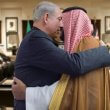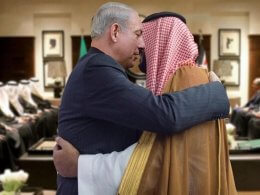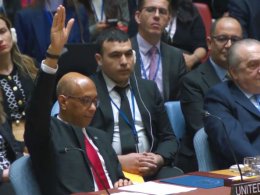In Israel, Defense Minister Benny Gantz announced the buildup of a new regional defense alliance against the Islamic Republic of Iran. The Defense Minister's announcement comes with the latest revelation that the United States held a top-secret meeting in Egypt with military officials from Israel, Egypt, Saudi Arabia, Jordan, Qatar, Bahrain, and the United Arab Emirates to counter the Iran regime’s growing threat.
The defense minister explained that Israel is building up a vast partnership with countries in the Middle East to ensure stability and economic prosperity while upholding Israel's regional interests first. The defense minister did not confirm the reports of the top-secret meeting between Israel, the U.S. and the Arab states but emphasized Israel's interest in normalizing ties with Saudi Arabia and Qatar.
According to Richard Goldberg, a senior advisor at the Washington D.C.-based think tank Foundation for Defense of Democracies (FDD), the "idea that an Israeli defense minister would be speaking openly about military cooperation with Arab states would've been unthinkable just a few short years ago. It is a testament to how much the region has evolved, where the existential security threats posed by Iran far outweigh tired political disagreements over the Palestinians.”
In his remarks, the defense minister stated that Israel is preparing for President Joe Biden's visit to the Middle East, hoping to have a positive development in acting against Iran and its terrorist proxies. Gantz also stressed his concerns over the ongoing nuclear negotiations between the U.S. and Tehran officials, explaining that the Israeli government approves of a bad nuclear agreement. According to Gantz, while Israel will continue to work with the U.S. over the issue of Iran's nuclear production, the Jewish state will do everything to defend itself and prevent Iran from obtaining a nuclear weapon no matter the cost.
The Biden administration has announced its Middle East trip to Israel, Saudi Arabia, and other Arab states to discuss economic issues like oil production and national security. Even though the administration's relationship with Saudi Arabia remains cold, Israeli officials hope that the President's visit to Riyadh will reset relations between the U.S. and the Persian Gulf state, moving the Saudi government to normalize ties with the Jewish state.
"The administration may use this initiative as a make-good to its allies for re-entering the Iran nuclear deal, assuring that the U.S. will continue to support its friends regardless," Richard Goldberg added.
"The problem is that the nuclear agreement would pour billions of dollars into Iran's Revolutionary Guard, missile program, and UAV program, worsening the threat this initiative tries to counter. In effect, the U.S. is playing both sides where one side is U.S. allies, and the other is the world's leading state sponsor of terrorism," Goldberg explained further.
In past years, the Islamic Republic of Iran has condemned Arab states for siding with Israel, vowing to retaliate against them and calling on Islamic supporters in these countries to rise and overthrow their governments. Currently, the Islamic Republic of Iran and the West are frustrated with each other over the ongoing 2015 nuclear talks, given that both sides are agitated over Tehran's growing demand for concessions. With Iranian officials announcing intent to go back to the table to continue negotiations, experts like Richard Goldberg point out that the Islamic regime is trying to "move quickly to defuse Washington's support for this alliance by leveraging the administration's continued desperation for a deal."
Currently, the Islamic Republic faces internal problems ranging from growing protest movements, economic devastation, and deaths of top Islamic Revolutionary Guards Corps (IRGC) officials. Many believe that now is the time for the U.S. to not engage in negotiations with the regime and instead encourage military cooperation between Israel and its Arab allies to overthrow the Islamic government in Iran.
According to Goldberg, "the reports that the U.S. has been a convener for these discussions and should remain such. Integrating air defense, leveraging U.S. satellite data, missile defense radars, and missile defense interceptors will make our allies safer, further, Arab-Israeli normalization, and separate our Gulf allies from reliance on Russia, China, and Iran."










